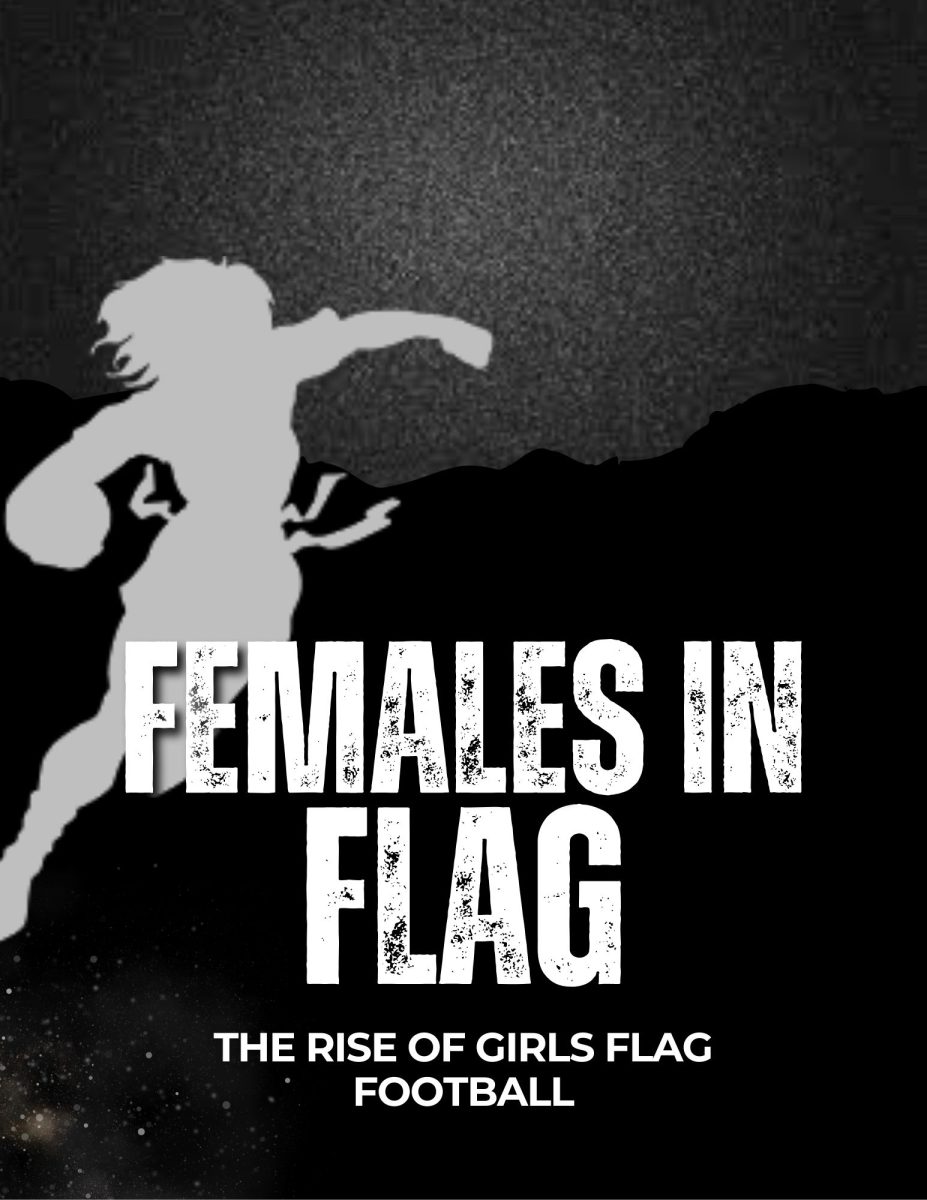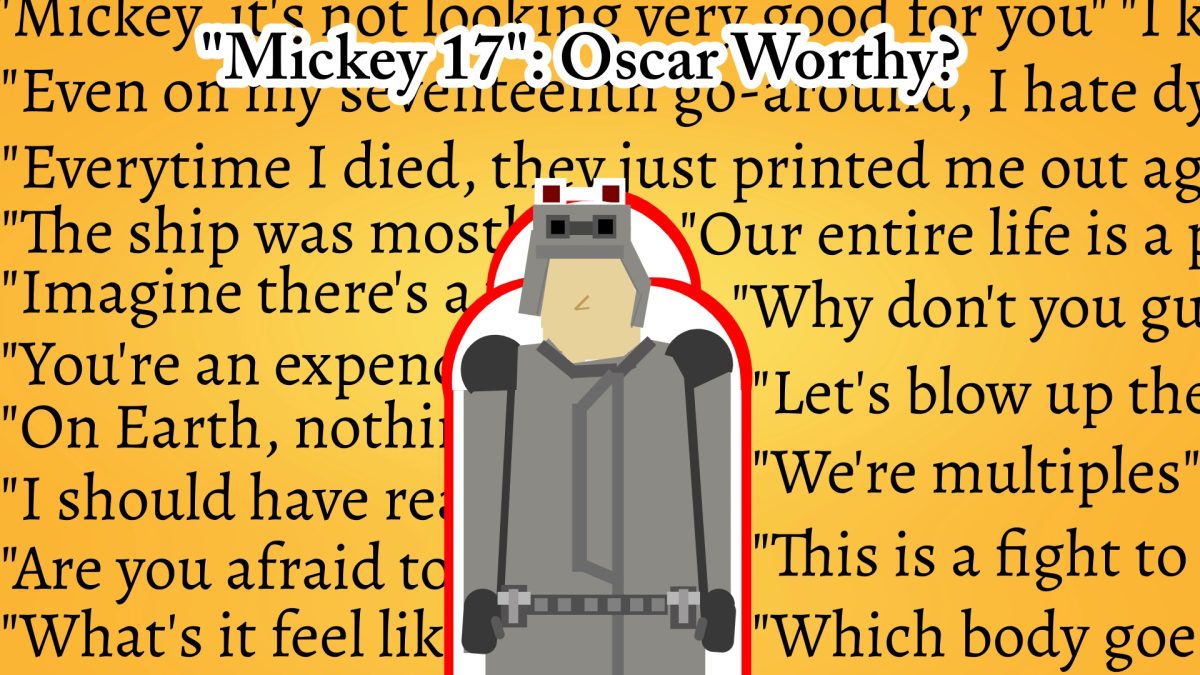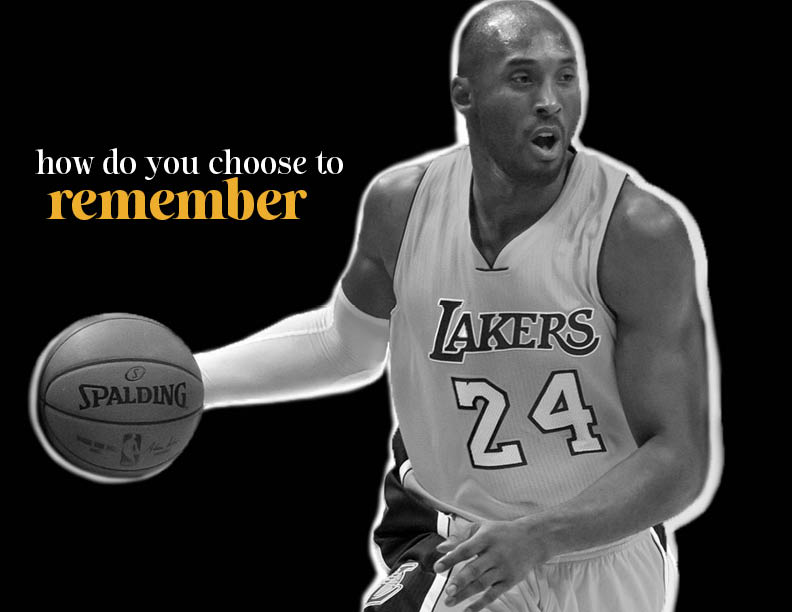How Do You Choose to Remember Kobe Bryant?
Op-Ed: The part of Kobe Bryant’s history that the world conveniently forgot about while they mourned. Does it matter?
media by Megan Tuin
A photo illustration of Kobe Bryant playing in a game against the Wizards. Photo originally by Alexandra Walt (labeled for use with modification on Flickr). Photo illustration by Megan Tuin ’21.
February 5, 2020
This week, the Lakers collected the trinkets and tributes left at the makeshift memorial for a fallen ‘hero’. The still world mourns Kobe Bryant- the world mourns the loss of him, his daughter, and the seven others who perished Jan. 26 in the Calabasas helicopter crash. Abruptly losing the basketball legend’s superhuman abilities on the court, and his humblingly human gestures off the court devastated the American public.
Twitter and Instagram were- and still are- inundated with celebrities’ 280-character expressions of sorrow. The world sent thoughts and prayers, posted photos of the legend, and collectively remembered Bryant’s profound career. The Grammy Awards, later the night of the 26, at the Lakers’ Staples Center, opened with an impromptu celebration of Bryant.
“We are literally standing here, heartbroken, in the house that Kobe Bryant built,” Alicia Keys, the host of the 62nd Grammys said before the tribute performance. Celebrities and audiences alike tweeted their sorrow using the hashtag #KobeBryant.
Just two years prior, the same award show fiercely advocated for victims of sexual assault using the #MeToo.
Most of the initial reports and eulogies within 24 hours of the crash detailed every known aspect of the tragedy, the victims’ lives, and Bryant’s 20-year career and family. Most completely failed to acknowledge the basketball legend’s felony sexual assault charge.
In July 2003, a 19 year-old Colorado woman reported to the police that Kobe Bryant raped her. In the 14 months leading up to the end of the criminal trial, this young woman faced death threats. She moved multiple times, between five different states. Her privacy and life were disrupted, all because she had the courage to speak out.
Bryant continued to play basketball.
This victim went up against one of the biggest basketball players in the world. So big, that in 2003 he signed a $40 million, four-year endorsement with Nike. Not only that, but Bryant’s salary from 2003-04 was $13.5 million. The Eagle County’s Judicial District, where his victim’s case was tried, had a budget of $2 million that same year.
She also went up against his team, who made it to their Western Conference semifinals that year. She faced his fans, and the death threats and comments they berated her with.
Intimidated by the celebrity of Bryant and his resources, and after losing faith in prosecutors when court transcripts leaked from her hearing, the woman decided to withdraw her testimony and criminal charges against Bryant were dropped. A civil case still continued after.
So we end with the question of how to define a man. Do you define Bryant by his illustrious career on and off the court?
Do you give Bryant the power of becoming an idol; immortalizing him in his athleticism and charisma?
Or does his destruction of a young woman’s life condemn him forever in your mind?
Bryant’s death reminds us that he is human. It is unacceptable to lionize him to the point that he becomes an infallible god.
Revere his domination of the NBA. Respect his dedication to his daughters. But with that needs to come the nuanced realization that Bryant hurt someone.
Even though he was never convicted, this young woman had to survive a tumultuous trial and ruthless backlash. Now, everywhere she turns she sees the world praising Bryant.
Regardless of what you believe, you cannot forget that 2003 happened. To do so would be ignorant. You cannot forget that one person in that courtroom was incessantly abused by the public. You cannot forget that the other returned to Los Angeles and to his successful career, to his $13.5 million, and to his Nike deal.
“The evil that men do lives after them; The good is oft interred with their bones,” Shakespeare wrote in Julius Caesar. The opposite seems to be true. Both need to be recognized.
To submit a letter to the editor, read our “about” page. To contact the editors of the Rock, email [email protected].



![Minutes before the Activities Fair in the gym, president Abhi Gowda ‘26 prepares the stall for his club Helping Hands, Sept. 4. A relatively new club, Helping Hands was co-started by Gowda and focuses on assisting the homeless, and just last year they succeeded in raising a couple hundred donations to send to shelters. This year, they have goals to expand, with hopes to increase volunteer opportunities and take in-person trips to shelters, as well as extend their help beyond just homeless people. “The Activities Fair gives a lot of underclassmen the opportunity to really get to know the Canyon culture, and it gives them many opportunities for service and volunteering,” Gowda said. “[Through the Activities Fair,] I hope to find a bunch of new and passionate members about our club and just get our name out there and spread awareness to the cause that we’re fighting for.”](https://rockmediaonline.org/wp-content/uploads/2025/09/1-2-1200x885.jpg)







![The winter guard team makes fifth place at the state championship finals in the Denver Coliseum, March 30. The team performed to Barnes Country's “Glitter and Gold,” lead by coaches Margo Sanford, Blair Bickerton and Anna Orgren. In their class there were a total of nine groups participating, and the top five who made it to finals received a plaque. “[Walking onto the stage] is very nerve-wracking, but also very exciting as well. When you first start color guard there's a lot of anxiety and uncertainty when you first perform in front of an audience, but once you've done it for a while, it starts to become the best part of the season,” Ella West ‘25 said. “It's very fulfilling to see an audience react to something you've put your heart and soul into.”](https://rockmediaonline.org/wp-content/uploads/2025/04/Both-socal-media-nd-website-main-1-1200x846.jpg)


![April marks the 25th anniversary of Sexual Assault Awareness Month, created by the National Sexual Violence Resource Center (NSVRC). This month is to spread awareness of the harassment, assault and abuse that happens around the world. The symbol that represented the month was a teal ribbon; however, some survivors of assault create different symbols and movements like the TikTok trend in 2022, where survivors would tattoo Medusa on their body, in honor of her backstory in Greek Mythology. “I don't think [this month is known] at all. I rarely see anybody talk about it. I rarely see much of an emphasis on posting it online, or much discussion about it, and I feel like there needs to be way more discussion,” an anonymous source said. “I think just validating every experience that a person has gone through, regardless of the degree of it, the severity, is an essential step into making sure that people are aware that this is a very real problem in a society and that we need to do better in addressing it.”](https://rockmediaonline.org/wp-content/uploads/2025/04/IMG_0011-1200x900.jpg)













![Lesbian Visibility Day is April 26, and it’s a holiday to celebrate the lesbian community of the world. Lesbian Visibility day was established in 2008 by many queer activists and organizations who sought to raise more awareness for lesbian history and culture. “So this is why during Lesbian Visibility [Day] we celebrate and center all lesbians, both cis and trans, while also showing solidarity with all LGBTQ+ women and nonbinary people,” Linda Reily, in an article written by her, said.](https://rockmediaonline.org/wp-content/uploads/2025/04/Lesbian-Visibility-day.jpeg)







Brittany • Feb 6, 2020 at 10:37 am
Now to begin I’m going to say just as you are entitled to your opinion so am I. This post of yours is truly disgusting, a horrible tragedy has struck and your response is to trash on such a great athlete who has done such great things and overcame so many obstacles. By attacking him using this information saying that he “allegedly” raped a woman is incorrect. On multiple articles it can state that the woman had walked into the room first. Huh crazy how that works isn’t it? She entered the room and even stated is was consensual, and when trial came she dropped charges and refused to give information to reporters on the so called incident. Of course I agree that no person should have to live with death threats due to situations like this but trashing on a great legacy who just died with his loved daughter is horriblly revolting. Along with this the woman after the incident both claimed they were in the wrong for what had happened. Instead of ruining this great mans reputation please check both sides and the facts with that. By the way you haven’t named the other people in the crash that is rude and so disrespectful to everyone else that has died in the crash.
Josh • Feb 6, 2020 at 10:37 am
You need to also take into consideration that Mamba League was something he created and helped coached. He took his time to help his daughter grow and lean the sport he loved. you need to know that he donated to help people. You need to know that his family is helping others who died in the crashe. He devoted his life to helping others. Calling this man ‘hero’ is disrespectful and plain out disgusting, so many people grower up with him. We the 21’ graduating class and above said “Kobe” every time we throw something. Yes he did do something wrong but that was 15 years ago in September 2004. He has tried to move on and forgige the acts that happened 15 years ago, he has tried to better himself and to make his life the best for him, his wife and his 4 daughters. So please next time think before you post something about an actual hero in the basketball world and in the real world.